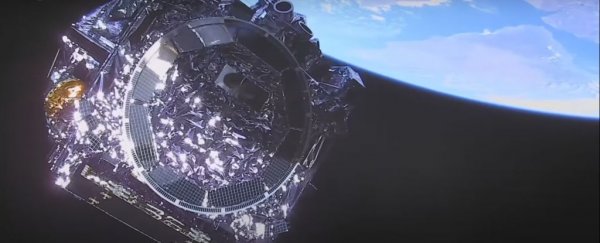We can all breathe a bit easier now. In spite of a launch bedeviled by problem after problem, NASA's James Webb Space Telescope is finally in space, making its way to its new home.
And if you needed a little reassurance that this is the case (which is totally understandable), the European Space Agency has released footage from the Ariane 5 rocket, which filmed the telescope in glorious HD as it zoomed away.
In the three-minute real-time video, you can watch as Webb separates from the rocket, moving away, the solar array deploying after 69 seconds.
It's headed for a location some 1.5 million kilometers (just under 1 million miles) from Earth, in a region called a Lagrange point.
Here, the combined gravitational forces of two larger bodies (in this case Earth and the Sun) create a small area of gravitational stability. Webb will sit in the second Lagrange point – there are five in total – on the far side of Earth from the Sun, also known as L2.
Not only will Webb be able to protect itself from the heat of the Sun, Earth, and Moon using its state-of-the-art sunshield, but it will also require the least amount of fuel, allowing its mission a much longer timeframe than other locations might.
That heat protection is crucial, by the way: The cryogenic temperatures at that distance will minimize the interference from heat sources that might mess with Webb's infrared measurements of the early Universe.
Because it's so much farther from Earth than Hubble, the Webb space telescope will need to operate with minimal human involvement. Engineers on the ground can communicate with the spacecraft, but we won't be able to service it at all. That means that we need to be able to fix any issues that might arise remotely, so it was worth the extra months making sure everything was in perfect condition before launch.
Ariane 5's parting footage will be the last time we clap eyes on Webb for some time, if we ever do again. It's possible that another spacecraft will be able to snap a passing glimpse or two, but you shouldn't bank on it. Webb isn't equipped with any self-monitoring cameras; it would have been quite complicated to add them, so we can't expect any fetching selfies as we see with the Mars rovers, for instance.
That's OK. Webb's got much bigger fish to fry when it reaches L2. It will arrive approximately a month after launch, so in a couple more weeks at the time of writing. Then it will need to be extensively tested and calibrated to make sure it's operating properly. Only then – approximately six months after launch – will the telescope's science operations commence.
We might expect to see "first light" images from the testing and calibration phase a little earlier than that. Meanwhile, we'll be sitting here hoping that Webb's journey goes smoothly.
Bon voyage, you glorious space telescope. Call home soon.
